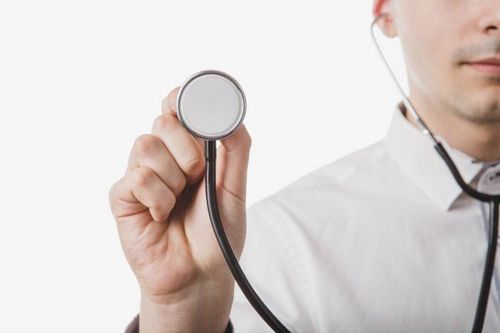This is an automatically translated article.
When you're trying to get pregnant, some of your habits may need to change. Here are 10 fertility enemies to avoid when you are actively trying to have a baby
1. Lubricant
There are some studies that have found that vaginal lubricants can damage sperm and interfere with their ability to travel to the uterus to fertilize an egg. While the pH (acidity) of cervical mucus produced just before ovulation is perfect for sperm survival and movement, the pH of most lubricants is not sperm-friendly. coincide. In fact, it is acidic enough to kill sperm. In addition, the thickness of the lubricant can make it difficult for sperm to move, and the water content can be harmful to sperm because they absorb water. The best lubricant to use when conceiving is foreplay. Take your time to have intercourse. Ask your partner to touch, hug, and kiss more. If you feel a burning sensation despite all your efforts during foreplay, try using warm water as a lubricant. Water is not toxic to sperm and will not interfere with sperm's ability to reach the cervix. If you still feel the need to use a lubricant while trying to get pregnant, it's best to choose a lubricant that has been shown in clinical trials to be safe and effective for conception.

Chất bôi trơn âm đạo có thể làm cản trở khả năng di chuyển của tinh trùng
2. Certain drugs
Stop all unnecessary drugs before trying to get pregnant, but of course, this is not always possible. Some that you should definitely avoid because they can harm your unborn baby include isotretinoin more commonly known as Accutane (for acne), Coumadin (an anticoagulant used to prevent blood clotting), tetracycline (for acne or infections), valproic acid (for epilepsy), ACE inhibitors (for high blood pressure), injectable or preventive medications such as Imitrex and propranolol (for migraines) ), antimalarials such as Plaquenil, or high doses of steroids such as cortisone and prednisone (for lupus). But make sure you talk to your doctor before stopping any prescribed medication.
Many over-the-counter drugs are safe in small amounts. But some nonsteroidal anti-inflammatory drugs (NSAIDS), such as Motrin, Aleve, or any medicine containing ibuprofen, can decrease ovulation and make the lining of the uterus less favorable for implantation. . With the exception of Tylenol, which may be safe to take at any time, you should only take NSAIDs during your period if you're trying to conceive.
The best advice is to talk to your doctor before taking any medicine. Many medications have safer alternatives for pregnant women. For example, if you need anticoagulants for deep vein thrombosis, heparin is safe and Coumadin is dangerous because it crosses the placenta. Or if you need an anticonvulsant for epilepsy then Dilantin has risks but is much safer than valproic acid.
3. Large amounts of caffeine
Caffeine may have an effect on fertility. Several studies have found a link between caffeine consumption and a woman's ability to conceive. Most experts say there isn't enough evidence to draw firm conclusions about caffeine and fertility. Although researchers were unable to find a clear link between moderate caffeine intake and fertility problems, it is generally considered safe to consume 200 to 300 milligrams (mg) of caffeine per day. while trying to conceive. That's up to two 8-ounce cups of coffee per brew. If you are consuming more than that then you should cut them down.

Kiểm soát lượng caffein dung nạp mỗi ngày để bảo vệ sức khỏe sinh sản của bạn
4. Mercury in fish
It's safe to eat fish if you're pregnant, planning to become pregnant or breastfeeding, as long as you limit your seafood intake and choose low-mercury varieties. In fact, if you don't normally eat seafood, consider adding it to your pregnancy, pre-pregnancy, or breastfeeding diet because fish offers nutritional benefits, including omega-3 fatty acids. Brain booster for you and your unborn baby.
Seafood that contains mercury metal will be passed to your baby during pregnancy and in breast milk. Too much mercury can harm your baby's developing brain and nervous system.
5. Wine
You should avoid drinking alcohol while trying to get pregnant and are pregnant because the fetus develops rapidly in the first weeks of pregnancy, even before the mother does not know she is pregnant. Some research shows that even a moderate level of alcohol can increase the chances of miscarriage.
Experts have yet to determine a safe level of alcohol for pregnant women, nor do they know if babies differ in their sensitivities and reactions to alcohol. But since the harmful effects of alcohol during pregnancy are well known, women trying to conceive and those already pregnant should probably choose safely and avoid all alcohol.
If you are trying to get pregnant, it is most important that you do not drink alcohol during the second half of your cycle, after ovulation because that is the time when you can get pregnant. If you get your period, you can have a few glasses of wine in the first half of your cycle while you wait for ovulation to return.

Một mức độ rượu vừa phải cũng có thể làm tăng khả năng sảy thai
6. Smoking
Smoking is not only harmful to a woman trying to conceive, it is also harmful to men. It is advised that all couples in fertility counseling should give up smoking as soon as possible. Tobacco has been shown to reduce sperm count and quality in men who smoke. It can also hurt antioxidant levels in semen. Antioxidants protect sperm from damage caused by free radicals that can affect their motility and ability to fertilize.
There is strong evidence that marijuana use also reduces male fertility. Marijuana can alter the endocrine system, the organ that regulates reproductive hormones, and lower a man's testosterone levels (the hormone responsible for sperm production). Cannabis is also toxic to human sperm, reducing motility and fertility. Use of marijuana and tobacco should be avoided while trying to conceive.
7. Certain chemicals
The chemicals in many common cleaners can be harmful to fertility. Synthetic fragrances in cleaning products, such as laundry detergents, are often bound by chemicals called phthalates. Air freshener products should also be avoided. Natural deodorants like baking soda and fresh air are good alternatives.Another group of chemicals, alkyl phenoxy ethoxylate (APE), is less known but also questionable. These are surfactants commonly found in laundry detergents and fabric softeners. In animal studies, APE has been associated with decreased sperm count and testicular size. Because they don't biodegrade easily, APEs enter the water system after they've been washed from your laundry. Solvents found in many glass cleaners, carpet cleaners, hard surface cleaners, and oven cleaners containing EGBE, or 2-butoxyethanol have been linked to reproductive problems in animals laboratory animals. The safest option for anyone hoping to have children is to check the product's safety data sheet to find out what's in it.

Những hóa chất có trong chất tẩy rửa có thể ảnh hưởng đến khả năng sinh sản
8. Stress
Stress can interfere with conception. In fact, if you're having trouble getting pregnant, you should relax, because stress can affect the activity of the hypothalamus, the gland in your brain that regulates your appetite and emotions. , as well as hormones that tell the ovaries to release an egg. If you're stressed, you may ovulate later in your cycle or not ovulate at all. If you only have sex around day 14 and think you're about to ovulate then you may be missing out on your chance to conceive. It is important to distinguish between continuous and sudden stress. If your stress levels are high but fairly stable, your body will likely adapt to it and you may still be able to ovulate from time to time. Sudden stress can disrupt your cycle and interfere with ovulation. It's important to remember that stress is not just a negative reaction. Positive stress can also affect your cycle, causing you to ovulate later or not at all.
9. Hot tub
Men who are trying to become fathers should probably avoid frequent or prolonged soaks in hot tubs. Studies have shown that sperm count is significantly reduced when the testicles are repeatedly exposed to heat. There is also some evidence that heat exposure can damage sperm DNA. Men's testicles need to be in a cooler environment to produce healthy sperm.
There is no evidence that heat affects a woman's eggs, but hot tubs and saunas are not recommended during pregnancy.
Some studies show that an increase in body temperature during early pregnancy (in a hot tub or sauna, or in a hot yoga class) increases the risk of neural tube defects and other birth defects. other congenital. A 2003 study reported that women who used a hot tub early in pregnancy were twice as likely to have a miscarriage.

Bồn tắm nước nóng không được khuyến khích sử dụng trong thai kỳ
10. Marijuana
Several studies have shown that repeated use of marijuana results in significantly lower levels of reproductive hormones in both men and women. Lower levels of the hormone testosterone can decrease sperm count in men. And lower dehydroepiandrosterone can affect egg production in women. In addition, THC enters the reproductive tract of women who use marijuana and reduces sperm motility, reducing the ability to fertilize. Some studies suggest that regular marijuana use during pregnancy puts the fetus at a higher risk of preterm birth and low birth weight. Smoking weed (or tobacco) increases blood carbon monoxide levels resulting in the fetus receiving less oxygen, which can affect the baby's development. Other studies show that children exposed to marijuana in utero have different brain activity and more disturbed sleep as toddlers. Some studies also show a link between prenatal marijuana exposure and lower school test scores.
For more information, please contact the hospitals and clinics of Vinmec Health system nationwide
Please dial HOTLINE for more information or register for an appointment HERE. Download MyVinmec app to make appointments faster and to manage your bookings easily.
Reference source: babycenter.com













